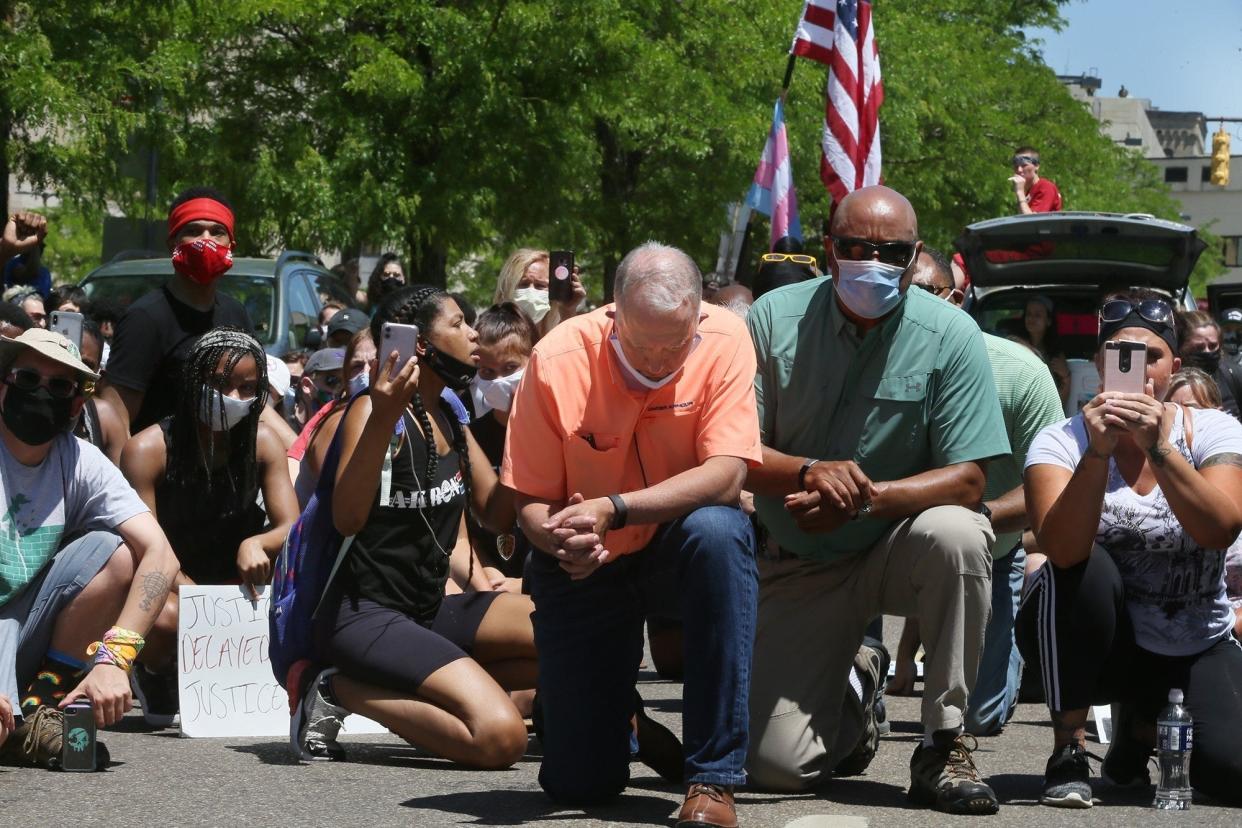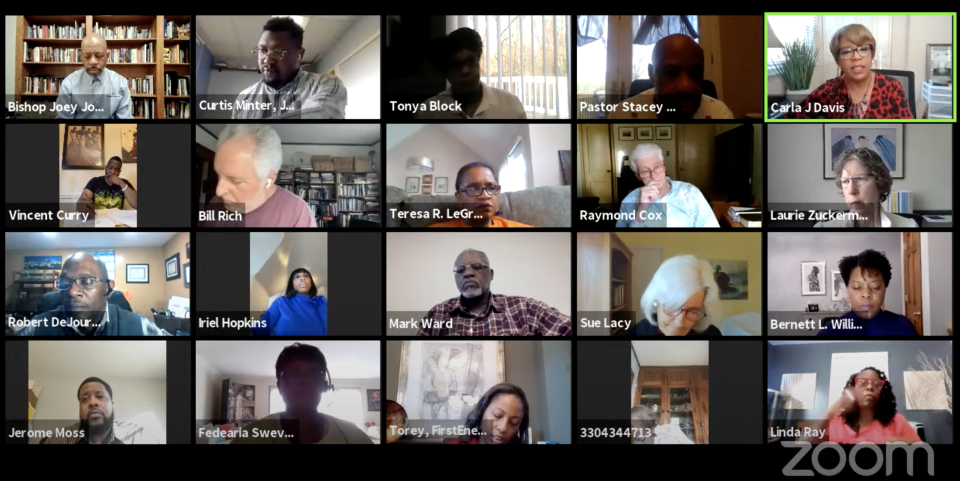Akron police reforms: Where the city stands on implementing recommendations

The Beacon Journal on Monday asked the president of City Council, the mayor and police chief to provide status updates on 21 recommended police reforms released in response to the 2020 killing of George Floyd by Minneapolis police.
Partial responses were received Thursday and Akron issued a press release with the same information Friday.
The Beacon Journal could determine that only five of the recommended reforms have been fully implemented.
Akron police: From George Floyd to Jayland Walker, here's where police reform stands in Akron.
After George Floyd's death in 2020, Akron City Council passed laws banning chokeholds and requiring officers to intervene if they observe police misconduct. A new ordinance also requires police to promptly release police footage of deadly force incidents.
Here's the status of each proposal since those initial actions.
Racial Equity and Social Justice Taskforce recommendations
The following recommendations were made in March.
✔ The police auditor’s position should be made full time:
“I was always working full time. I just wasn’t getting paid for it," said Police Auditor Phil Young, who is now paid full time.
❌ The auditor should have a full-time deputy:
“That I haven’t heard anything at all. I guess the mayor would have to answer that question,” said Young. (The Beacon Journal did not receive a specific response from Mayor Dan Horrigan.)
❌ The auditor should have a full-time administrative assistant:
“I’ve hired three different people, but they all found better paying jobs,” said Young, who interviewed an Akron Public Schools secretary, a county employee and a United Way worker for the position that’s been empty since 2009. The candidates were given prior experience, and offered increased pay, but they turned down a wage slightly higher than the $15-an-hour minimum for municipal employment.
✔ When requesting documents, photographs, audio recordings, electronic files, body-worn camera footage and other police evidence, the auditor should be given access within 72 hours:
“Usually, yes, within 72 hours,” said Young, who’s been waiting a week for one police record. “Now, I know they’ve been quite busy, but usually within 72 hours I get everything.”
❌ The police auditor should have convenient access to software used by APD to monitor police discipline and use of force:
“That has not happened. I’m not sure what’s happening with that,” said Young, who was trained on IA Pro, the software used by police supervisors to track commendation, complaints and use of force incidents for sworn officers. Young said he thinks his request for access is hung up in the city’s law department.
❌ Within 72 hours, the chief should inform the auditor of an internal investigation, a citizen complaint, use of force, an in-custody death or serious injury or a lawsuit against police:
“Some of that has happened,” said Young, who gets next-day notification on use of force, deadly encounters with police and citizen complaints but no notification of serious injuries or lawsuits alleging police misconduct.
❌ All uniformed officers, including SWAT, should be required to wear cameras:
SWAT, narcotics and school resource officers employed by the Akron Police Department are not required to wear body cameras.
❌ Uniformed officers should be required to wear cameras while engaged in secondary employment:
Officers who perform off-duty security at bars, weddings, events and public housing complexes are not required to wear city-issued cameras. Police officials have said there aren’t enough cameras to go around. The mayor's office is exploring the "full cost and feasibility" of equipping off-duty officers and deploying cameras on private property.
❌ Body-worn cameras should be activated when responding to in-progress calls, when exiting the police vehicle on other calls and whenever force is used:
"The City agrees with this recommendation and believes that the activation recommendation of 'use whenever reportable force is used' should cover the first two activation guidelines recommended," the mayor's office said. "Formal adoption of this policy across units requires additional coordination between agencies and legal review."
While officers are required to activate their Axon body-worn cameras when interacting with the public during the course of their duties, footage has shown that they are not required to keep the cameras rolling every second they are out of their vehicles.
✔ Body-worn camera recordings should be uploaded at the end of each shift:
The police department, in detailing the implementation of the body-worn camera system more than six years ago, said this is common practice.
✔ Officers should be disciplined for failing to wear or activate body-worn cameras:
Discipline logs obtained by the Beacon Journal show officers have been reprimanded for not activating their cameras.
✔ The public should have access to redacted body-worn camera videos in critical incidents within seven days as required by the charter amendment overwhelmingly approved by voters in 2020 and enacted by the Akron City Council in 2021:
Akron police have posted the footage required by city law to a YouTube channel within a week of recent incidents. More than three officer videos, the minimum per ordinance, were released for the Jayland Walker case.
❌ The mayor, in 2022, should begin the process of creating a civilian oversight board.
Horrigan said he is exploring models in other cities at this time. On Thursday, Akron Ward 8 Councilman Shammas Malik asked the law department to draft legislation for a charter amendment for voters to consider establishing a civilian review board.
Beyond 2022, the task force laid out a five-year plan to fully implement the Civilian Oversight Board, as well revisions to police department policies on hiring, promoting and training, and the creation of a “true community policing strategy.”

Reimagining Public Safety recommendations
Akron City Council's special committee on Reimagining Public Safety recommended eight reforms in January 2021.
❌ Codify the Office of the Independent Police Auditor to ensure "sufficient authority to access information, adequate staffing and funding, and independence from the political process." Young told a reporter to check with the law department or mayor.
The mayor's office said it created a job description for the auditor position. Young was required to sign a confidentiality agreement in exchange for access to police records often shielded from public disclosure pending investigations or because they contain personal information of victims, witnesses and officers.
On Thursday, Akron Ward 8 Councilman Shammas Malik asked the law department to draft legislation for a charter amendment for voters to consider establishing the office of independent police auditor.
❌ Work with Akron police and mayor to "ensure that more police data and information is made publicly-available online and updated on a regular basis."
The Beacon Journal is awaiting a response on whether this has been implemented.
❌ Fund crisis intervention team training for all officers, especially patrol and supervisors who respond to calls:
The Blue Ribbon Taskforce commissioned by Mayor Horrigan released a report in 2016 citing that less than half (45%) of Akron officers had completed critical incident training. It’s unclear if that percentage has improved. The Beacon Journal is awaiting a response from the police department.
❌ Expand community and social services partnerships, finding ways to involve social service providers in follow-ups and potentially in co-responding to some 911 calls:
Mental health providers with Community Support Services accompany police on some calls, but there’s been only support voiced from some members of City Council for a “community responder” initiative.
❌ Build regular foot and bike patrols into Patrol Bureau schedules to "solidify stronger relationships between police officers and the communities they diligently patrol and serve."
The Beacon Journal is awaiting a response on whether this has been implemented.
❌ Create a Pathway to Law Enforcement program. Individuals under 21 years old would work "community-facing city jobs (as 311 dispatchers, in parks and recreation or service) while taking courses at Stark State and/or the University of Akron on policing, social services, mental health, etc. Participants could become police officers at 21, when state allows civil servants to carry firearms.
The Beacon Journal is awaiting a response on whether this has been implemented. Ohio law prevents peace officers from carrying firearms until 21 years of age.
❌ Work locally and with state agencies to expand in-service trainings. Possibly standardize roll call trainings with improved roll call room technology. Advocate for more state funding for training.
The Beacon Journal is awaiting a response on whether this has been implemented.
❌ Eliminate maximum age requirement of 40 for police recruits. In 2019, the mayor upped the maximum age for police cadets from 35 to 40 (and for firefighter recruits from 31 to 35).
There’s been no indication that anyone over 40 can become a police officer in Akron as other Ohio cities began removing age restrictions in 2016 to ease recruitment challenges and boost diversity with a larger pool of candidates.
City status update on police reforms by dhlivingston on Scribd
Reach reporter Doug Livingston at dlivingston@thebeaconjournal.com or 330-996-3792.
This article originally appeared on Akron Beacon Journal: Status of police reform in Akron after George Floyd and Jayland Walker

